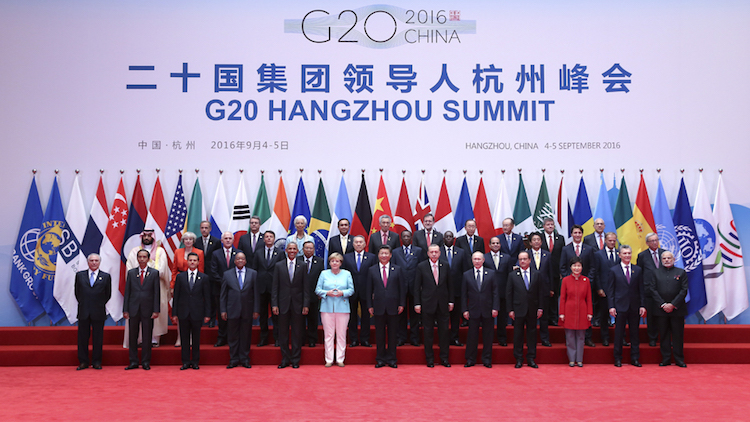By Jutta Wolf
BERLIN (IDN) – ‘Shaping an interconnected world’ is the slogan Germany has chosen for its Presidency of the Group of Twenty (G20) summit of heads of state and government on July 7-8 in the port city of Hamburg. It is based on three thematic pillars: building resilience, improving sustainability, and assuming responsibility.
The German Economic Cooperation Ministry (BMZ) has contributed to defining the German G20 agenda, as all three pillars are closely related to development cooperation.
Building resilience relates to financial services for small and medium-sized enterprises, and sustainable supply chains (innovative financing models, improvement of the general environment, especially for small and medium-sized enterprises) such as the textile sector.
Improving sustainability implies implementation of the 2030 Agenda, digital education for girls (#eSkills4Girls), renewable energy for Africa, and addressing climate change and environmental risks (climate insurance, climate finance, implementation of Nationally Determined Contributions), marine conservation, preventing pandemics, and strengthening health systems.
Responsibility relates to partnership with Africa, food security, agricultural innovation and youth employment, financial services for disadvantaged population groups with a focus on displaced people, and equity in taxation.
This agenda is particularly important because G20 is comprised of 19 countries plus the European Union. The countries are Argentina, Australia, Brazil, Canada, China, France, Germany, India, Indonesia, Italy, Japan, Mexico, Russia, Saudi Arabia, South Africa, South Korea, Turkey, the United Kingdom and the United States of America.
The G20 countries produce around 80 percent of global economic output in terms of gross domestic product (GDP) adjusted for purchasing power parity. In 2015, China’s GDP was around 19.7 billion international dollars when adjusted for purchasing power parity. This makes China the largest economy in the world, followed by the United States, India and Japan. Germany was in fifth place, at 3.9 billion international dollars.
G20 countries account for three‑quarters of global trade. China, the United States, Germany and Japan are the four largest exporting countries in the world. Of the 20 countries with the largest volume of exports worldwide, 15 are members of the G20.
Around two‑thirds of the global population live in the G20 member countries. China, the country with the largest population in the world, has approximately 1.38 billion inhabitants, closely followed by India, which has a population of 1.3 billon. The United States, Indonesia and Brazil are next in the list. Germany is in seventeenth place.
G20 was set up in 1999 in response to the global economic and financial crisis. It has now started to increasingly address the development of answers to other global challenges as well.
At their summit in Seoul in 2010, G20 heads of state and government agreed on a global development strategy that focuses on inclusive economic growth as the centrepiece of global poverty reduction. Ever since, development policy has been a topic in its own right on the agenda of the G20 process.
As part of Germany’s G20 Presidency, the BMZ is advancing the ‘GreenInvest’ dialogue platform in order to engage developing countries in the mainstreaming and mobilisation of green finance. A first consultation of developing countries under the GreenInvest platform was held in Singapore on January 9-10 with participants from some 25 developing countries.
BMZ Parliamentary State Secretary, Thomas Silberhorn said: “Within the German development cooperation, we are placing a strong emphasis on supporting our partners in building local financial systems and framework conditions to mobilize and shift private investments towards a sustainable future. GreenInvest is an excellent vehicle to advance our joint understanding and setting the stage for scaled-up action on green finance.”
UN Environment has been selected to develop and manage GreenInvest, building on its extended experience in advancing sustainable finance. UN Environment’s co-Director of the Inquiry into Design Options for a Sustainable Financial System, Simon Zadek said: “UN Environment welcomes the opportunity through its involvement in GreenInvest to highlight the innovations by, and accelerate the flow of green finance in developing countries.”
GreenInvest seeks to ensure that developing countries will have a voice in the evolution of green finance initiatives and practices across the global financial system. It is based on an initiative launched during Mexico’s G20 Presidency in 2012 and will feed into the newly established Sustainability Working Group under Germany’s G20 Presidency. It complements other green finance work streams under Germany’s G20 Presidency including the Green Finance Study Group in the Finance Track. [IDN-InDepthNews – 24 February 2017]
Photo: Heads of government and state at the G20 Summit in Hangzhou, China, on 4 September 2016. Credit: www.g20chn.org.
IDN is flagship agency of the International Press Syndicate.

